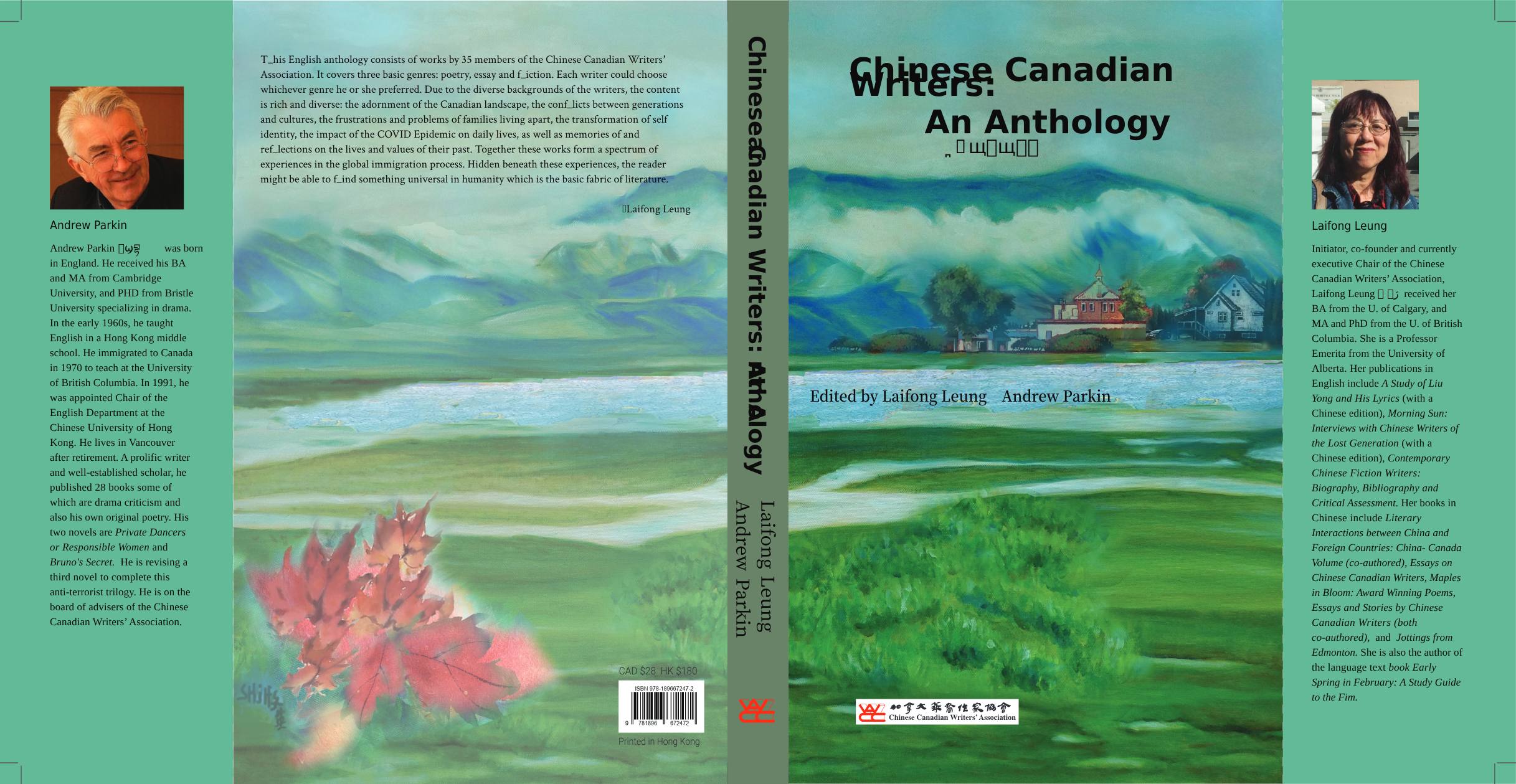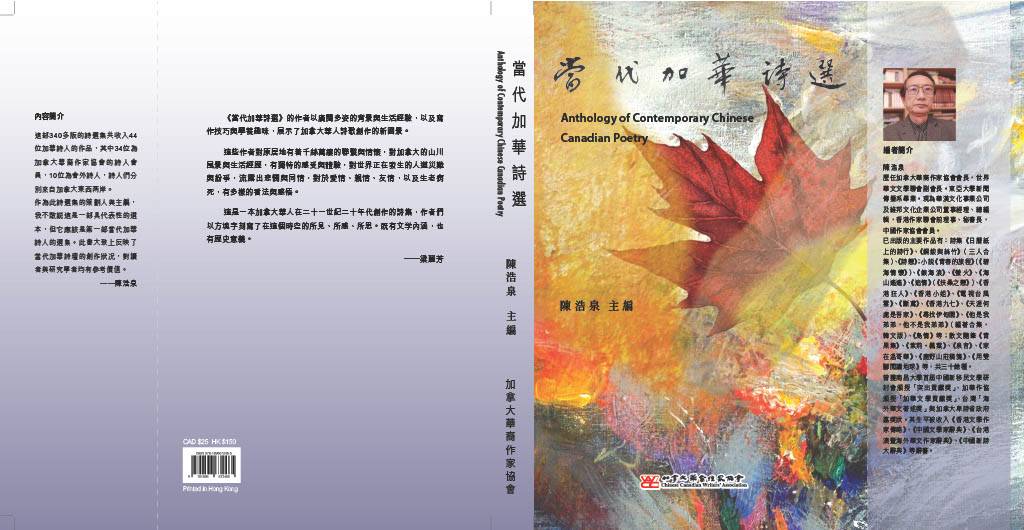
Brief introduction to the Chinese Canadian Writers’ Association
By William Chan, Laifong Leung
The Chinese Canadian Writers’ Association (CCWA) was founded and registered in British Columbia in 1987. The founding chair was Paul Lo and vice-founding chair was Dr. Laifong Leung. The aim of the association is to encourage literary writing, publication and research, to enhance communication and exchange of ideas, as well as to promote cultural interactions among writers from different parts of the world.
Honorary Chair: Kwan Kay Pui
Founding Chair: Paul Lo; Vice-Founding Chair: Laifong Leung
Chair persons from 1987-2024: Paul Lo, Laifong Leung, William Chan, Lily Liu, Tingting Lin, William Chan, Laifong Leung, William Chan
Advisers: (alphabetical order)
Gongzhong Chen, Jiangong Chen, Paul Crowe, Chu-jen Hu, Graham Johnson, Angela Kan, Hyejoon Kim, K.L. Leung, Zaifu Liu, Shiqing Lu, Hualing Nieh, Hsien-yung Pai, Jae Woo Park, Andrew Parkin, Yiuming Poon, Jan Walls, Lieyao Wang, Waileung Wong, Ya Xian, Jiayan Yan, Chiaying Yeh, Daxiang Yu, Songjing Yu, Chouyu Zheng
Advisers (deceased): Michael Bullock, Lo Fu, Yichang Liu, Xindi Wang, Guangzhong Yu, Minzhi Zeng
Publications:
(1) Anthologies published by the CCWA
Anthology of Chinese Canadian Writers I (Fenghua wenji: Jiahua zuojia zuopin xuan), 1999, edited by William Chan.
Anthology of Chinese Canadian Writers II (Baixue hongfeng: Jiahua zuojia zuopin xuan), 2003, edited by William Chan.
Anthology of Chinese Canadian Writers III (Fengxue pian: Jiahua zuojia xiaoshuo xuan), 2009, edited by Lilli Liu.
Adventures Shared on the Maple Leaf Road: Selected Works of Chinese Canadian Fiction (Fengyu tonglu: Jiahua zuojia xiaoshuo xuan), 2009, edited by William Chan.
He Is My Brother; He Is Not My Brother. Korean translation of the above title. Seoul: ZMANZ Press, 2016.
Canadian Maple: Chinese Leaves: Chinese-Canadian Literary Reviews (Fenghua zhengmao: Jianhua wenxue pinglunji), 2009, edited by William Chan.
Maplescapes: Selected Works of Chinese Canadian Prose (Fengjing zhebian duhao: Jiahua zuojia sanwen xuan), 2013, edited by William Chan.
Maples in Bloom: Award-winning Poems, Essays and Stories by Chinese Canadian Writers (Fengzi chuoyue: Diyijie jiahua wenxuejiang wenji), 2014, edited by William Chan & Laifong Leung.
Essays on Chinese Canadian Writers: Celebrating the 30th Anniversary of the Chinese Canadian Writers’ Association (Jianada huaren wenxue lunwenji: jinian Jianada huayi zuojia xiehui chuanghui 30 zhounian), 2019, edited by Willilam Chan & Laifong Leung.
(2) Writer Series
From the 1990s onward, the CCWA has published a variety of literary works by a number of writers, namely Xiaoli Cao, William Chan, Yifen Ge, Laifong Leung, Tingting Lin, Anita Lo, Han Mu and Meiyu Lao, Dong Qing, Nelson Tsui, Jiexin Wang, Wenqin Wang, Bosheng Xie, Qing Yang, Yuping Yang, and Qingqing Zhao.
(3) CCWA publications: newspapers, journals
1. Ten issues were published in the Chinese Times in 1990.
2. Thirty-five issues were published in the Sing Tao Daily, 2000-2003.
3. Monthly issues were published in the Chinese Global News from 2006-2019.
4. Column essays by CCWA members under the title “Maple and Snow” (Fengxue pian) appeared in Sing Tao Daily and Chinese Global News in the 2010s.
5. Twelve issues of the bilingual journal Chinese Canadian Writers Quarterly was published.
6. Special literary page was published in the local journal Huabao and Xinsheng in 2018.
(4) Chinese Canadian Literature, bimonthly (288 issues so far), electronic version, see: www.ccwriters.ca
New book
Chinese Canadian Writers: An Anthology
(加華作家作品選)
Planner: William W.Y. Chan
Editors: Laifong Leung, Andrew Parkin
Cover Painting: Wan Ying Shih
Cover Design: Ting Wai
This English anthology consists of works by 33 members of the CCWA. It covers three basic genres: poetry, essay and fiction. Each writer could choose whichever genre he or she preferred. Due to the diverse backgrounds of the writers, the content is rich and diverse: the adornment of the Canadian landscape, the conflicts between generations and cultures, the frustrations and problems of families living apart, the transformation of self identity, the impact of the COVID Epidemic on daily lives, as well as memories of and reflections on the lives and values of their past. Together these works form a spectrum of experiences in the global immigration process. Hidden beneath these experiences, the reader might be able to find something universal in humanity which is the basic fabric of literature.
Laifong Leung
Preface
The idea of compiling an anthology in English by members of the Chinese Canadian Writers’ Association (hereafter: CCWA) has been on my mind for quite some time. The CCWA was founded in 1987 by Mr. Paul Lo and myself with the enthusiastic support of friends fond of literature and writing. Throughout the years, the CCWA has grown from a handful of people into a larger group, with members from Greater Vancouver, other parts of Canada and beyond. Maintaining the spirit of literary volunteers, we have organized many activities including ten international symposiums on Chinese Canadian literature. book launches, lectures, monthly literary gatherings, and the annual poetry recitation with poets from diverse ethnic backgrounds at the Sun Yat-sen Classical Garden. Apart from being active in the local community, the CCWA members have been invited to interact with literary organizations in Mainland China, Hong Kong, Taiwan, and Southeast Asia. From the 1990s onward, more than one hundred writers and scholars have come to Canada for cultural interactions.
Up to the present, several anthologies in Chinese devoted to fiction, essay, poetry as well as symposium article collections have been published, largely due to the effort of the current Chair Mr. William Chan, an established writer and publisher from Hong Kong. These works have placed us on the map of global Sino-phone literature as well as Chinese Canadian literature. However, they are only accessible to those who can read Chinese.
This English anthology consists of works by 33 members of the CCWA. It covers three basic genres: poetry, essay and fiction. Each writer could choose whichever genre he or she preferred. Due to the diverse backgrounds of the writers, the content is rich and diverse: the adornment of the Canadian landscape, the conflicts between generations and cultures, the frustrations and problems of families living apart, the transformation of self identity, the impact of the COVID Epidemic on daily lives, as well as memories of and reflections on the lives and values of their past. Together these works form a spectrum of experiences in the global immigration process. Hidden beneath these experiences, the reader might be able to find something universal in humanity which is the basic fabric of literature.
Readers will notice that many works in this anthology are English translations from the original Chinese texts. The translators have surely done a great job in this endeavor. Those written in English were mostly by Canadian born Chinese or those who have lived in Canada for a long time. Readers may detect their different angles of observation.
From the earliest known Chinese landing on Vancouver Island in the late 18th century to the present, Chinese immigrants have gone through many stages in making Canada their home. The gold rush starting in 1858 along the Thompson River and Fraser Canyon attracted many Chinese gold-seekers already in California and soon from their hometown (mainly the Four Counties, ie. Taishan, Kaiping, Enping and Xinhui) in the Pearl River Delta region in Guangdong Province. In the 1880s, the building of the Trans-Canada Railway brought in nearly twenty thousand Chinese workers from these places. Despite their contribution, however, the Chinese in general suffered from decades of discrimination: the head tax (beginning in 1885) and the exclusion act (beginning in 1923), in particular. History however, moves on in a positive way. Thanks to the soldiers of Chinese descent who participated in the Second World War, the head tax and exclusion act (1923-1947) was abolished and the Chinese were able to vote. In 1967 the point system of immigration has attracted a large number of Chinese immigrants from diverse backgrounds. This number increased drastically in the 1990s with the changing situation in Hong Kong and Mainland China, particularly the Tiananmen Incident (1989).
Contrary to one’s assumption, even though the Chinese community was under the dark shadow of discrimination from the late 19th century to the first half of the 20th century, its members, however, remained active culturally. Being largely a community of bachelors (as wives and women were discouraged or not allowed to come), cultural activities became their pastime. Besides Chinese newspapers (such as the Chinese Times) which helped build the imaginary community, there were drama troupes, reading groups, opera performances as well as frequent poetry competitions, couplet competitions, speech contests and many more. Since the second half of the 20th century, with the influx of Chinese immigrants from Hong Kong, Southeast Asia, Mainland China and elsewhere, the cultural landscape of the Chinese community has become more prosperous and diverse. This English anthology thus can be seen as a manifestation of the new mixture of old and new immigrants.
In the process of preparation, I have been fortunate to have Professor Andrew Parkin as co-editor. He was former Chair of the English Department at the Chinese University of Hong Kong and has served as adviser to the CCWA for more than 15 years. He helped read through the English manuscript, which was a dauting task. The rest of the work was my responsibility. We are happy to have the opportunity to present the voices of the CCWA members to the readers.
By Laifong Leung, Ph.D
Professor Emerita, U of Alberta
Co-founder & Executive Chair, the Chinese Canadian Writers Association
July 11, 2024, Vancouver

